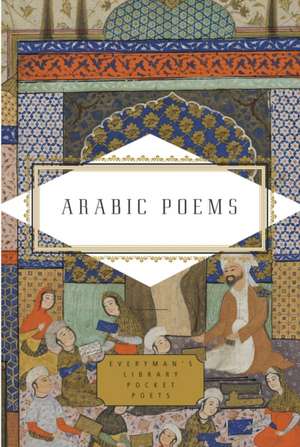Arabic Poems: Everyman's Library POCKET POETS
Editat de Marle Hammonden Limba Engleză Hardback – 26 iun 2014
The Arabic poetic legacy is as vast as it is deep, spanning a period of fifteen centuries in regions from Morocco to Iraq. Poets include the legendary pre-Islamic warrior 'Antara Ibn Shaddad, medieval Andalusian poet Ibn Zaydun, the wandering poet Al-A'sha, and the influential Egyptian Romantic Ahmad Zaki Abu Shadi.
Din seria Everyman's Library POCKET POETS
- 16%
 Preț: 58.34 lei
Preț: 58.34 lei - 16%
 Preț: 63.71 lei
Preț: 63.71 lei - 16%
 Preț: 53.52 lei
Preț: 53.52 lei - 16%
 Preț: 63.46 lei
Preț: 63.46 lei - 16%
 Preț: 53.50 lei
Preț: 53.50 lei - 16%
 Preț: 53.55 lei
Preț: 53.55 lei - 16%
 Preț: 58.59 lei
Preț: 58.59 lei - 17%
 Preț: 63.40 lei
Preț: 63.40 lei - 16%
 Preț: 63.71 lei
Preț: 63.71 lei - 16%
 Preț: 53.43 lei
Preț: 53.43 lei - 16%
 Preț: 58.60 lei
Preț: 58.60 lei - 16%
 Preț: 53.37 lei
Preț: 53.37 lei - 17%
 Preț: 62.74 lei
Preț: 62.74 lei - 16%
 Preț: 63.81 lei
Preț: 63.81 lei - 16%
 Preț: 58.40 lei
Preț: 58.40 lei - 16%
 Preț: 58.56 lei
Preț: 58.56 lei - 16%
 Preț: 53.52 lei
Preț: 53.52 lei - 17%
 Preț: 63.37 lei
Preț: 63.37 lei - 17%
 Preț: 63.05 lei
Preț: 63.05 lei - 30%
 Preț: 53.36 lei
Preț: 53.36 lei - 16%
 Preț: 53.47 lei
Preț: 53.47 lei - 16%
 Preț: 53.96 lei
Preț: 53.96 lei - 16%
 Preț: 63.43 lei
Preț: 63.43 lei - 16%
 Preț: 53.42 lei
Preț: 53.42 lei - 16%
 Preț: 58.53 lei
Preț: 58.53 lei - 16%
 Preț: 58.28 lei
Preț: 58.28 lei - 16%
 Preț: 53.42 lei
Preț: 53.42 lei - 16%
 Preț: 53.59 lei
Preț: 53.59 lei - 17%
 Preț: 63.29 lei
Preț: 63.29 lei - 16%
 Preț: 53.42 lei
Preț: 53.42 lei - 16%
 Preț: 58.32 lei
Preț: 58.32 lei - 16%
 Preț: 53.53 lei
Preț: 53.53 lei - 16%
 Preț: 53.91 lei
Preț: 53.91 lei - 16%
 Preț: 58.37 lei
Preț: 58.37 lei - 17%
 Preț: 57.90 lei
Preț: 57.90 lei -
 Preț: 63.36 lei
Preț: 63.36 lei - 17%
 Preț: 63.36 lei
Preț: 63.36 lei - 23%
 Preț: 58.34 lei
Preț: 58.34 lei - 17%
 Preț: 63.33 lei
Preț: 63.33 lei - 16%
 Preț: 53.47 lei
Preț: 53.47 lei - 16%
 Preț: 53.52 lei
Preț: 53.52 lei - 17%
 Preț: 63.24 lei
Preț: 63.24 lei - 16%
 Preț: 58.53 lei
Preț: 58.53 lei - 16%
 Preț: 53.55 lei
Preț: 53.55 lei - 16%
 Preț: 53.74 lei
Preț: 53.74 lei - 17%
 Preț: 63.33 lei
Preț: 63.33 lei -
 Preț: 113.48 lei
Preț: 113.48 lei - 17%
 Preț: 63.37 lei
Preț: 63.37 lei - 16%
 Preț: 63.51 lei
Preț: 63.51 lei - 16%
 Preț: 58.25 lei
Preț: 58.25 lei
Preț: 63.77 lei
Preț vechi: 76.13 lei
-16% Nou
Puncte Express: 96
Preț estimativ în valută:
12.20€ • 12.69$ • 10.08£
12.20€ • 12.69$ • 10.08£
Carte indisponibilă temporar
Doresc să fiu notificat când acest titlu va fi disponibil:
Se trimite...
Preluare comenzi: 021 569.72.76
Specificații
ISBN-13: 9781841597980
ISBN-10: 1841597988
Pagini: 256
Dimensiuni: 111 x 165 x 25 mm
Greutate: 0.25 kg
Editura: EVERYMAN
Seria Everyman's Library POCKET POETS
ISBN-10: 1841597988
Pagini: 256
Dimensiuni: 111 x 165 x 25 mm
Greutate: 0.25 kg
Editura: EVERYMAN
Seria Everyman's Library POCKET POETS
Notă biografică
Editor Biography:
Marlé Hammond is Lecturer in Arabic Popular Literature and Culture at SOAS, University of London.
